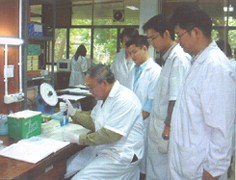|
Professor
Dr. Prasert Sobhon was born
on December 8, 1943 in Sakolnakorn
Province, Thailand. Following primary
and secondary education in Thailand,
he went to study abroad and received
B.Sc. in Human Biology from the
University of Western Australia
under the Colombo Plan Scholarship,
and Ph.D. in Cell Biology and Anatomy
from the University of Wisconsin,
U.S.A., under the Rockefeller Foundation
Fellowship. He did his postdoctoral
study at the University of California
at Los Angeles, and later became
a WHO visiting research scientist
at National Institute of Medical
Research, Mill Hill, London. He
has been an academic staff of Faculty
of Science, Mahidol University since
1970, and was appointed Professor
of Cell Biology and Anatomy in 1991.
In addition to academic work, during
his career he has held many important
administrative positions, including
Chairman of Anatomy
Department, Associate Dean for
Academic Affairs, Vice President
for Academic Affairs, President
of Mahidol University Academic Senate,
and most recently Dean, Faculty
of Science, Mahidol University.
From his research Contributions
he was conferred the Mahidol University
Award for Outstanding Research (1982),
Oustanding Scientist Award (1995)
from Thailand Foundation for the
Promotion of Science and Technology
under the Royal Patronage of His
Majesty the King, and Senior Research
Scholar Fellowship from the Thailand
Research Fund (1997-present).

His research work and interests are in three areas of biomedical and bioagricultural disciplines. First are the characterizations of antigens and encoding genes of human blood flukes (S.japonicum, S. mekongi) and human and animal liver flukes (Opisthorchis viverrini and Fasciola gigantica), their syntheses and expressions at the cellular level, and their immunodiagnostic and vaccine potentials. Second are the studies on spermatogenic process, basic nuclear proteins and chromatin organization in male germ cells of vertebrates, including mammals and amphibians, and invertebrates especially mollusks (snails and abalone) and crustaceans (shrimp and prawn). Third are the studies on neurobiology and reproductive biology of economic mollusks and crustaceans (especially abalone and prawns) particularly with respect to the identification of neuro-secretory cells that are involved in the production of growth and gonadotrophic factors which can stimulate the growth and gametogenic processes in these animals. His research work has been supported continuously by national funding agencies, including the National Research Council of Thailand, National Science and Technology Development Agency, The Thailand Research fund, and international organizations including Ford Foundation, Rockefeller Foundation. USAID, and UNDP / World Bank / WHO Special Programme for Research and Training in Tropical Diseases.
|

